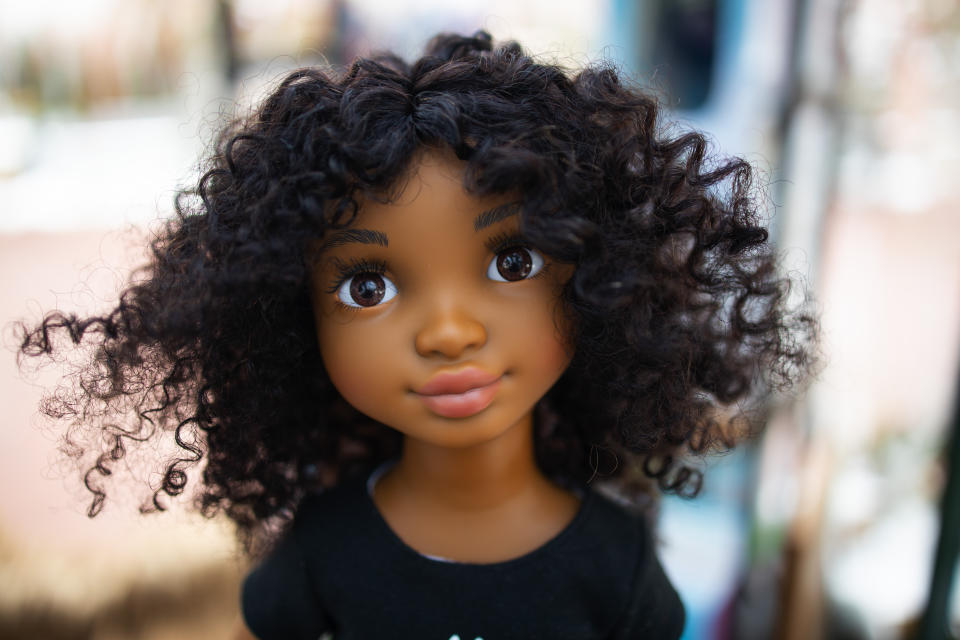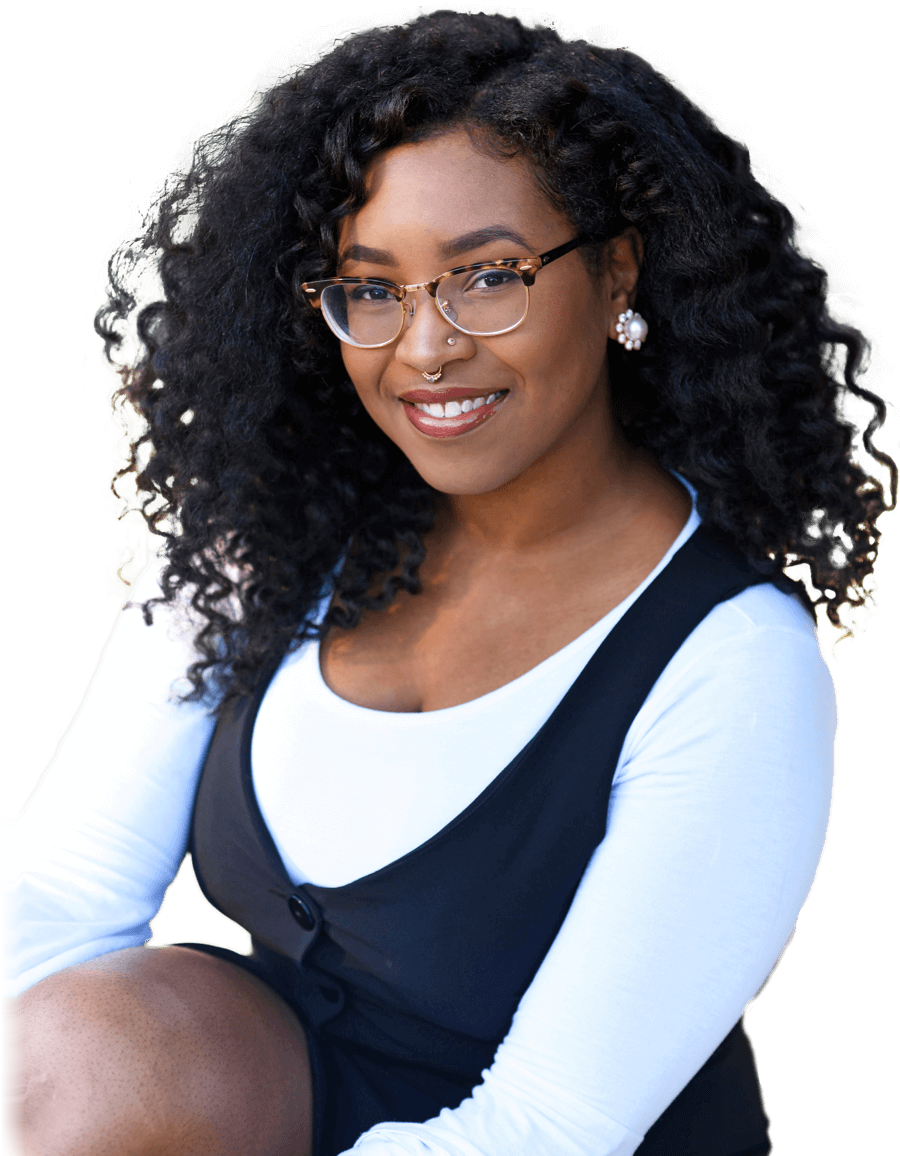'I didn't have toys that looked like me:' Yelitsa Jean-Charles shares her journey in creating the Zoe doll
Yelitsa Jean-Charles considers it the moral obligation of artists like herself to be advocates since they possess the “unique responsibility to create value, to educate and to inform” audiences.
When a student at the Rhode Island School of Design, Jean-Charles could have followed the well-worn path of her fellow students who started their careers as designers at major toy companies. But her responsibility gnawed at her, motivating her to turn a school project into her company, Healthy Roots Dolls.
Jean-Charles reflected on her childhood and the struggles she experienced with not having any dolls that looked like her. She wanted to “get into children's media” to “create the narratives and create the visuals” she didn’t have.
“That meant taking my experiences as a woman of color in America, recognizing that I didn't have toys that looked like me growing up, recognizing how the media that we consumed influenced my ideas of what was beautiful and my perception of myself,” Jean-Charles said. “Then, deciding that I didn't want little girls to feel like that growing up.”
Healthy Roots Dolls is a toy company that aims to do more than diversify the toy aisle. It’s a company that teaches young children to embrace what makes them special. Zoe the doll has curly hair that can be styled and comes with companion stories that explore themes of self-love, hair care, and body positivity.
Cashay connected with Jean-Charles to learn more about her drive, entrepreneurship, and why Zoe and Healthy Roots Dolls are for everyone.

[Author’s note: Interview has been edited for clarity and length]
Cashay: So tell me about Zoe and Healthy Roots Dolls.
Yelitsa Jean-Charles: Healthy Roots Dolls is a toy company that creates multicultural children's products, much like this doll, that teaches girls to love themselves just the way they are. This is Zoe, she's the first Healthy Roots Dolls and the first doll that teaches girls how to take care of their natural hair.
I created her because, while there are brown dolls, you have to do so much more than paint a doll brown in order to connect with children of color. She's uniquely designed with hair that is full of curl power, much like mine, that can be washed and styled with real products to teach girls just how much work goes into taking care of their curls and how to love it.
I started my junior year at the Rhode Island School of Design. The company was born out of a class project where I took Rapunzel and I redesigned her as a little brown girl with kinky curly hair.
As an undergrad, I was very involved in social activism movements like Black Lives Matter. I was protesting and bringing the dialogue to my campus. I realized, as artists, we have a unique responsibility to create value, to educate, and to inform our audiences. That's something I needed to bring into my curriculum, my coursework, and after graduation.
That meant taking my experiences as a woman of color in America, recognizing that I didn't have toys that looked like me growing up, recognizing how the media influenced my ideas of what was beautiful and my perception of myself, and then deciding that I didn't want little girls to feel like that growing up. I got into children's media so I can create the narratives and visuals that I didn't have.
Zoe was born from that class project and it was all because I took it to Facebook and I talked to my peers. What I didn't realize I was doing was I was validating a need and defining a problem because so many women were telling me they never had dolls that looked like them or they didn’t know how to do their hair.
I was thinking about the fact that was 20 years old and I don't know what to put in my hair. Is it coconut oil? Is it olive oil? What do I do? That's really disappointing that so many women in America or around the world don't feel like they can wear their natural hair.
That's where Healthy Roots Dolls started. I know it sounds weird to go from wanting to be a children's book illustrator to creating a physical product. But it isn't that crazy considering that my school basically funnels people to Hasbro and so many creative people work in those industries. I was able to network and learn more about toys before I ultimately took that step.
Cashay: You began as an illustrator, is that why the books are also part of the deal for the Zoe doll?
Yelitsa Jean-Charles: As an illustrator, a creative, we have the ability to create whatever content we want. I'm thinking about all the different things that Healthy Roots Dolls can produce to add to the Zoe experience. That can be books, outfits, other characters, or an animated series. Of course, I'm going to use my skill set to create as many possible things.

Cashay: Can you talk a little bit about actually developing the design?
Yelitsa Jean-Charles: The first version I made out of clay and aluminum foil. I painted it and I sewed an outfit. The next version of the doll, I sculpted by hand and I found someone who could do 3D rendering because I had dropped out of the CAD classes. My brain could not get around creating something 3D but on a flat-screen. I had to find people who knew how to scan my Zoe sculptures. That's how we got the first doll.
For the second doll, I sketched and someone else sculpted. I found the sculptor through Debbie Sterling from GoldieBlox. I had gotten her card three years ago and kept it. I reached out to her and said, “Hey, I'm looking for help in these areas. Do you know anyone?” She introduced me to an amazing sculptor.
Cashay: Have you always had that desire to be an entrepreneur?
Yelitsa Jean-Charles: My family immigrated from Haiti and I recently learned that they owned things while they were in their native country. My mom's family owned a farm, my dad’s family owned property, and my grandma was selling products. I was raised to always see opportunities and to maximize things.

I wouldn't say I was never allowed to fail, but it was always expected that I would make things work. They always showed me how to do those things. I remember I broke my pencil in elementary school, my dad was like, “okay, fix it.” And I said, “I don't have a sharpener.” He took a knife and started sharpening the pencil. He's using things he has available to make things happen. That's just how I was raised.
Cashay: Can you talk about designing the hair specifically because that's really what seems to set Zoe apart?
Yelitsa Jean-Charles: It's difficult because I had to learn how to communicate and what I like to call overstanding. I don't need people to understand me, I need them to overstand.
There's a language barrier when you're working with manufacturers overseas. There's a lack of cultural understanding because their idea of curly hair and my idea of curly hair are very different textures. Educating them through video calls about the unique material that we're looking for and giving them samples was a tedious process, but the results speak for itself.
Cashay: It looks like you've partnered with Proctor & Gamble. Can you talk about how that came together?
Yelitsa Jean-Charles: We partnered with Procter & Gamble's ‘My Black is Beautiful’ brand, which focuses on representation and diversity specifically for Black women. We connected because I was featured on local news in Cincinnati, which is where they're headquartered, and someone on their team saw it and reached out.
We partnered with them because we found that their products were great for different curly hair textures. Also, the messaging and mission aligned. It just made sense.

Cashay: Is Zoe for everyone?
Yelitsa Jean-Charles: That's definitely something we considered when we were creating the product and the company. When we did our Kickstarter campaign, we saw people who are Black and part of the diaspora purchasing it but parents who have biracial or adopted children and non-Black children sharing and backing it.
I feel like our tweet went viral because of the tension that's going on in our country and the conversations that we're having about racism and these oppressive systems, but also because people who saw it as an opportunity to highlight something positive and recognize a small way that they can bring those conversations into their home. You don’t have to be a Black child to have a Black doll. You can be any child.
Now we have so many options, not just Healthy Roots Dolls, to create the diversity in play that we see in our reality. The fact that more and more parents are recognizing our doll as an opportunity to bring in toys that represent the people that their children are going to interact with and have conversations is incredibly important and a great educational value.
Cashay: You spoke a little bit about the current moment, how do you see this moving forward for your company to, I guess not to take advantage of, but to capitalize on an opportunity.
Yelitsa Jean-Charles: I think capitalizing on opportunities is great, especially if you have a specific goal. My goals and mission for this business are to empower young girls, educate children, and bring diversity to the toy aisle.
This viral moment and the conversations that people are having allow us to push that forward because I'm not here to sell dolls. I'm here to undo what was done to me as a child. Zoe is just one way for me to do that.
If bringing brown girls brown dolls is able to help them unpack the stigma that they have around their hair and their own appearance, that's perfect.
We're doing preorders and pursuing all opportunities that are coming our way like partnerships, collaborations, and holiday campaigns to ultimately to further our mission by reaching as many children as possible.
Cashay: Can you talk a little bit about leveraging your network?
Yelitsa Jean-Charles: I learned that a lot of things are about who you know. Healthy Roots Dolls went viral because I've built a network of people who engage with me that have a bigger reach and influence, who love the work that I'm doing.
This isn’t an overnight success. I've been at this for five years. People have learned about our business because I've put it out there at events and programs, and I've won competitions. Those were all ways for me to build my network. And not in a way where I capitalize on people, but people see an opportunity to amplify our mission statement and they see the greater impact and that's something that they want to support. They help us with that.
There's nothing wrong with wanting to connect with someone and being explicit about whether or not you want something from them. I've reached out to people and told them plainly, “You are good at X, Y, and Z. Would you be willing to help me with this?” Or, “I know that you know so-and-so, and if you're open to it, I would love an introduction for X, Y, and Z.” I've done those things and obviously it's helped, but I feel like you have to be honest with people.
Networking is also about the value you create for other people. The same way that people help me, I'm open and reciprocal. I'm in a network entrepreneurial-minded grads. Any of those people are free to hit me up and ask me for advice on things. Literally, I have a new mentee who I'm talking to now.
People want to help people because they were in that position. They understand the value of sharing their experience of things that they know in their network. Don't be afraid to ask plainly and candidly for what you want.

Cashay: How would somebody who's just starting out and wants to be an entrepreneur take those first steps?
Yelitsa Jean-Charles: I always understood what I was trying to deliver. I had this one piece of advice from my friend: there are three steps to doing anything, figure out what you want to do, figure out how to do it, and then you do it.
When you have clarity and purpose on what you're executing, that allows you to speak confidently and ask directly. It's very hard.
If I had gone to Debbie [Sterling] and said, “Hey, I'm just trying to learn about the toy industry. What can you tell me?” That's not as good as, “Hi, I'm working with this factory and these are some of the issues I'm facing. Do you have any experience with this? And could you help?” It's so much easier for people to help you if you tell them how to help you. Tap your resources.
If you're a college student, your professors are your first mentors. You're literally paying them to help you, so make sure you do that. Go to your career resources office. They can connect you to people in their industries. Go to events— obviously not during COVID— but when campuses reopen. Research relevant events to the industry that you want to be in or the work that you want to do. Go meet people and have conversations.
Cashay: Where do you see yourself in 10 years?
Yelitsa Jean-Charles: I hope to have built a very large business with international availability and a solid team that shares my vision of empowering girls. Hopefully, I have some type of nonprofit.
I’d also like to work with interns so they can develop leadership and technical skills through our company to go onto different industries. My goal is to be out in public and randomly see a little girl with one of the dolls because my friends have seen it and I want to see it.

Cashay: How do you see Healthy Roots Dolls evolving along with customers as they grow up?
Yelitsa Jean-Charles: We're definitely going to grow with our customers and listen to their needs and what issues they're experiencing as they're aging. That'll definitely influence the content and the products we produce.
Cashay: Does the toy industry and dolls in particular offer specific challenges?
Yelitsa Jean-Charles: Plenty of people have said, “this is niche” or, “this is expensive” or, “only Black people will buy this.” As if people of color are not a large percent of the global population and other children can't purchase this doll in general. They didn't recognize the market opportunity or that Black people have trillions of dollars in buying power, define trends, and marketing strategies.
Our audience to start is African-American consumers and that's a powerful, influential audience to begin with. If they love us, everyone's gonna love us.
Stephanie is a reporter for Yahoo Money and Cashay, a new personal finance website. She can be reached at stephanie.asymkos@yahoofinance.com. Follow her on Twitter @SJAsymkos.
Read more information and tips in our Career section






